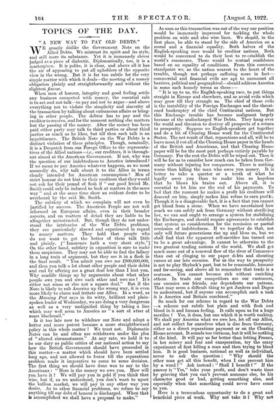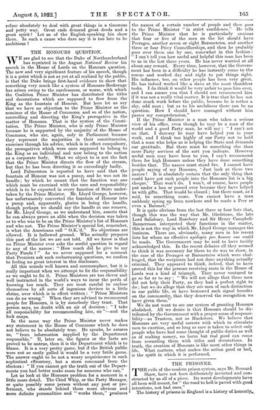TOPICS OF THE DAY.
"A NEW WAY TO PAY OLD DEBTS."
WE greatly dislike the Government Note on the Allied Debts. We mistrust its spirit and its style, and still more its substance. Yet it is immensely clever judged as a piece of dialectic. Diplomatically, too, it is a masterpiece. It is polite, it is clear, and above all it has the air of appearing to put all upholders of the opposite view in the wrong. But it is far too subtle for the very simple matter with which it deals—the meeting of a money obligation plainly and straightforwardly and without the slightest finesse. When men of honour, integrity and good feeling settle any business connected with money, the essential rule is to act and not talk—to pay and not to argue—and above everything not to violate the simplicity and sincerity of the transaction by talking about extraneous affairs or bring- ing in other people. The debtor has to pay and the creditor to receive, and for the moment nothing else matters but the passing of the money. After the money has been paid either party may talk to third parties or about third parties as much as he likes, but till then such talk is an impertinence. The British Note on the War Debts is a distinct violation of these principles. Though, nominally, it is a Despatch from our Foregn Office to the representa- tives of the Allied nations—i.e., our creditors, it is through- out aimed at the American Government. If not, why was the question of our indebtedness to America introduced? If we mean to pay America whatever happens, as we most assuredly do, why talk about it to the Allies in terms intended ntended for American consumption ? Men of strict honour do not hint to their creditors that they would not ask for their pound of flesh if "our good friend Mr. Smith could only be induced to look at matters in the same way" and at the same time show an evident desire to be overheard by the said Mr. Smith. The subtlety of which we complain will not even be justified by success. The American People are not well informed on European affairs, even in their broader aspects, and on matters of detail they are liable to be altogether uninstructed. But, though they do not under- stand the intricacies of the War Debts problems, they are particularly shrewd and experienced in regard to money matters. They hold that people who do not want to get the better of them talk little and plainly. [" Innocence hath a very short style."] On the other hand, subtlety in exposition is sure to make them suspicious. They may not be able to find the fallacy in a long train of argument, but they see it in a flash in the final result. "You admit you owe me £900,000,000, and then you talk a lot about other people and their debts and end by offering me a great deal less than I lent you. Why muddle things up by arguments about what other people owe you and owe each other and owe me ? It's either not sense or else not a square deal." But if the Note is likely to rub America up the wrong way, it is even more likely to alarm and irritate our Allies. In a word, as the Morning Post says in its witty, brilliant and plain- spoken leader of Wednesday, we are doing a very dangerous as well as a very undignified thing by taking a line which may well seem to America as a sort of attar of roses blackmail."
Is it too late now to withdraw our Note and adopt a better and more potent because a more straightforward policy in this whole matter ? We trust not. Diplomatic Notes can be and often are withdrawn under the plea of "altered circumstances." At any rate, we hold it to be our duty as public critics of our national action to say how the British Government should have proceeded in this matter—a matter which should have been settled long ago, and not allowed to fester till the reparations problem made it imperative to come to some decision. The first thing we should have done was to say to the Americans : Here is the money we owe you. How will you have it ? We will pay you in gold if you think that wise, but if, as we understand, you don't want to upset the bullion market, we will pay in any other way you desire. As to other financial problems, we refuse to say anything till our debt of honour is discharged. When that is accomplished we shall have a proposal to make." As soon as this transaction was out of the way our position would be immensely improved for tackling the whole problem on wide and also wise lines. We should, in the first place, be able to stand by the side of America on a moral and a financial equality. Both halves of the English-speaking race would be creditor nations. Both would be concerned to do their best to re-establish the world's commerce. There would be mutual confidence based on an equality of conditions. From this common standpoint we, as the nation nearest to the heart of the trouble, though not perhaps suffering more in fact— commercial and financial evils are apt to surmount all barriers, political and geographical—should address America in some such homely terms as these :— " It is up to us, the English-speaking race, to put things straight in Europe and elsewhere, and so avoid evils which may grow till they strangle us. The chief of these evils is the instability of the Foreign Exchanges and the threat- ened bankruptcy of the chief Continental nations. But this Exchange trouble has become malignant largely because of the undischarged War Debts. They hang over the world and threaten to destroy all prospects of a return to prosperity. Suppose we English-speakers get together and do a bit of Clearing House work for the Continental States. The net result of that, reparations and all, will be to leave most if not all of the Clearing House paper in the hands of the British and Americans, and that Clearing House paper will be for the most part perhaps entirely payable by Germany. For the rest the Debts will be wiped out. Then it will be for us to consider how much can be taken from Ger- many without injuring her conquerors. There is nothing worse than killing the man who owes you money. It is better to take a quarter or a tenth of what he legally owes you than to make him so hopeless that he blows his brains out. Above all, it is essential to let him see the end of his payments. To feel that the moment he makes a profit his creditors will descend on him, simply makes him refuse to earn profit. Though it is a disagreeable fact, it is a fact that you cannot get blood from a stone. When we have ascertained how much we can safely ask from Germany without sterili7ing her, we can and ought to arrange a system for stabilizing the Exchanges, and should require agreements to establish that system as consideration for the remission or partial remission of indebtedness. If we together do that, not only will future generations rise up and bless us, but we shall find that the apparent self-sacrifice has turned out to be a great advantage. It cannot be otherwise to the two greatest trading nations of the world. We shall get much more out of a renewed flow of the river of Commerce than out of clinging to our paper dcbts and shouting curses at our late enemies. For us the way to prosperity is not to play Shylock's part, but to be reasonable, humane and far-seeing, and above all to remember that trade is a mututen. You cannot become rich without enriching others. In trade our competitors are our customers, our enemies our friends, our dependents our patrons. That may seem a difficult thing to get Junkers and Dagos to understand, but if anyone can accomplish such a task it is America and Britain combined."
So much for our scheme in regard to the War Debts —a scheme not subtle but plain and with flesh and blood in it and human feeling. It calls upon us for a huge sacrifice ? Yes it does, but one which it is worth making. We shall pay America what we owe her, let off our Allies, and not collect for ourselves what is due from Germany, either as a direct reparations payment or on the Clearing House account. It sounds too virtuous, but it will be nothing of the kind. It will pay us far better than letting France, in her misery and fear and exasperation, try the crazy experiment of first killing a man and then trying to bleed him. It is good business, national as well as individual, never to ask the question : "Why should the other man get all this benefit, when I can prevent him by a word?" Ask instead : "Shall I benefit ? " If the answer is "Yes," take your profit, and don't waste time by grieving that you can't prevent someone else, be his character good or bad, getting something also, and especially when that something could never have come to you. Here is a tremendous opportunity to do a great and beneficial piece of work. Why not take it ? Why not refuse absolutely to deal with great things in a timorous and petty way. Great ends demand great deeds and a great spirit ? Let us of the English-speaking kin show them. In such a cause who dare say it is too late to be ambitious ?



































 Previous page
Previous page